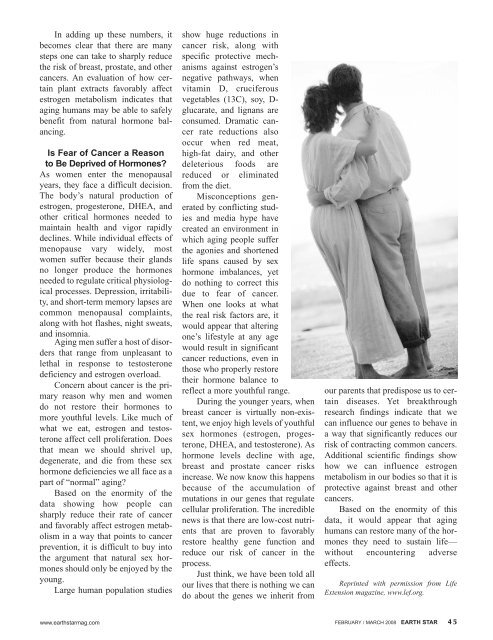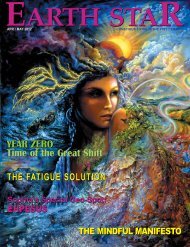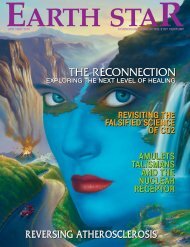GREGG BRADEN GREGG BRADEN - Earthstar
GREGG BRADEN GREGG BRADEN - Earthstar
GREGG BRADEN GREGG BRADEN - Earthstar
- No tags were found...
You also want an ePaper? Increase the reach of your titles
YUMPU automatically turns print PDFs into web optimized ePapers that Google loves.
In adding up these numbers, itbecomes clear that there are manysteps one can take to sharply reducethe risk of breast, prostate, and othercancers. An evaluation of how certainplant extracts favorably affectestrogen metabolism indicates thataging humans may be able to safelybenefit from natural hormone balancing.Is Fear of Cancer a Reasonto Be Deprived of Hormones?As women enter the menopausalyears, they face a difficult decision.The body’s natural production ofestrogen, progesterone, DHEA, andother critical hormones needed tomaintain health and vigor rapidlydeclines. While individual effects ofmenopause vary widely, mostwomen suffer because their glandsno longer produce the hormonesneeded to regulate critical physiologicalprocesses. Depression, irritability,and short-term memory lapses arecommon menopausal complaints,along with hot flashes, night sweats,and insomnia.Aging men suffer a host of disordersthat range from unpleasant tolethal in response to testosteronedeficiency and estrogen overload.Concern about cancer is the primaryreason why men and womendo not restore their hormones tomore youthful levels. Like much ofwhat we eat, estrogen and testosteroneaffect cell proliferation. Doesthat mean we should shrivel up,degenerate, and die from these sexhormone deficiencies we all face as apart of “normal” aging?Based on the enormity of thedata showing how people cansharply reduce their rate of cancerand favorably affect estrogen metabolismin a way that points to cancerprevention, it is difficult to buy intothe argument that natural sex hormonesshould only be enjoyed by theyoung.Large human population studiesshow huge reductions incancer risk, along withspecific protective mechanismsagainst estrogen’snegative pathways, whenvitamin D, cruciferousvegetables (13C), soy, D-glucarate, and lignans areconsumed. Dramatic cancerrate reductions alsooccur when red meat,high-fat dairy, and otherdeleterious foods arereduced or eliminatedfrom the diet.Misconceptions generatedby conflicting studiesand media hype havecreated an environment inwhich aging people sufferthe agonies and shortenedlife spans caused by sexhormone imbalances, yetdo nothing to correct thisdue to fear of cancer.When one looks at whatthe real risk factors are, itwould appear that alteringone’s lifestyle at any agewould result in significantcancer reductions, even inthose who properly restoretheir hormone balance toreflect a more youthful range.During the younger years, whenbreast cancer is virtually non-existent,we enjoy high levels of youthfulsex hormones (estrogen, progesterone,DHEA, and testosterone). Ashormone levels decline with age,breast and prostate cancer risksincrease. We now know this happensbecause of the accumulation ofmutations in our genes that regulatecellular proliferation. The incrediblenews is that there are low-cost nutrientsthat are proven to favorablyrestore healthy gene function andreduce our risk of cancer in theprocess.Just think, we have been told allour lives that there is nothing we cando about the genes we inherit fromour parents that predispose us to certaindiseases. Yet breakthroughresearch findings indicate that wecan influence our genes to behave ina way that significantly reduces ourrisk of contracting common cancers.Additional scientific findings showhow we can influence estrogenmetabolism in our bodies so that it isprotective against breast and othercancers.Based on the enormity of thisdata, it would appear that aginghumans can restore many of the hormonesthey need to sustain life—without encountering adverseeffects.Reprinted with permission from LifeExtension magazine, www.lef.org.www.earthstarmag.com FEBRUARY / MARCH 2008 EARTH STAR 45
















